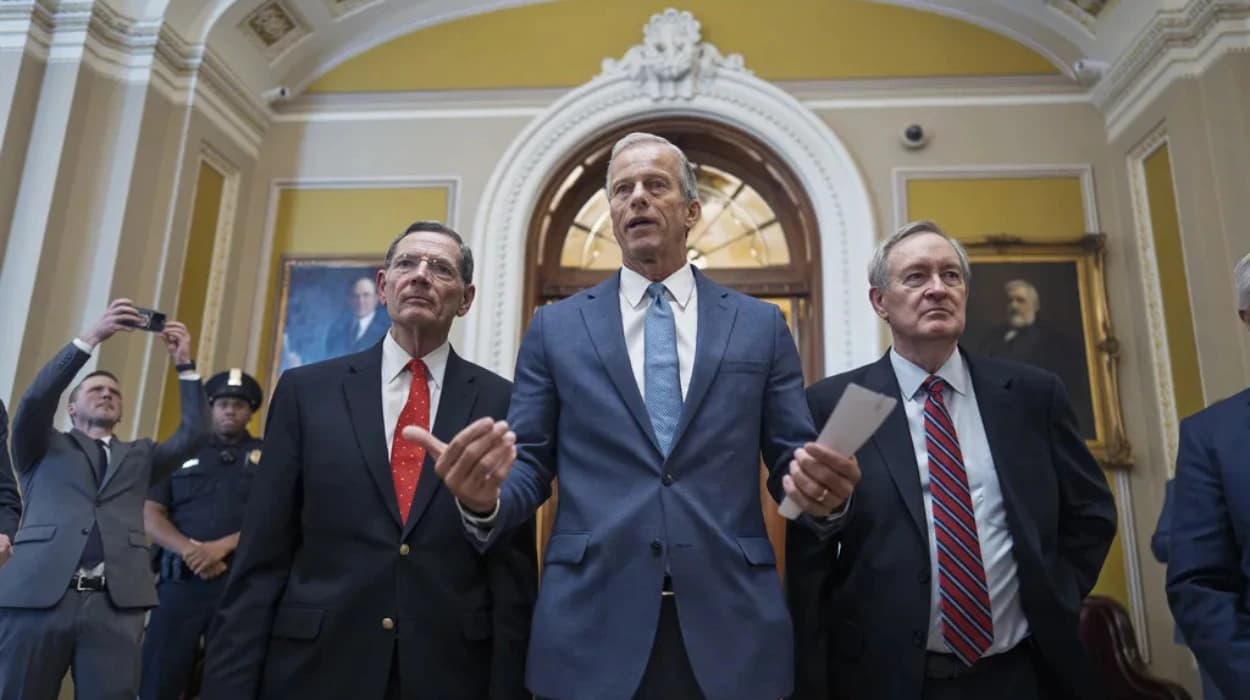Summary
- Trump met congressional leaders Monday to prevent government shutdown.
- Both Democrats and Republicans showed little willingness to compromise.
- Democrats demand extension of healthcare subsidies and Medicaid reversals.
Many government offices nationwide would be temporarily closed and nonexempt federal employees will be placed on furlough if government funding legislation is not approved by Congress and signed by Trump on Tuesday night. This will further burden the workforce and the country's economy.
Prior to the conference, White House officials made it apparent that the Republican administration had no plans to engage in negotiations.
“The president wants to keep the government open, he wants to keep the government funded,”
press secretary Karoline Leavitt told reporters at the White House on Monday morning, adding Trump was “giving Democrats one last chance to be reasonable today.”
Republicans are daring Democrats to vote against legislation that would keep government funding mostly at current levels, but Democrats have held firm. They’re using one of their few points of leverage to demand Congress take up legislation to extend health care benefits.
“The meeting is a first step, but only a first step. We need a serious negotiation,”
Senate Democratic leader Chuck Schumer said Sunday on NBC’s
“Meet the Press.”
Despite agreeing to meet with Schumer, Senate Majority Leader John Thune, House Speaker Mike Johnson, and House Democratic leader Hakeem Jeffries on Monday, Trump has not shown much interest in accommodating Democrats' demands on health care. The Republican president has stated time and time again that he fully anticipates a government shutdown this week.
“If it has to shut down, it’ll have to shut down,”
Trump said Friday.
“But they’re the ones that are shutting down government.”
By threatening to permanently lay off government employees in the event of a funding breach, the Trump administration has attempted to persuade Democratic senators to renounce their demands.
“Chuck Schumer said a few months ago that a government shutdown would be chaotic, harmful and painful. He’s right, and that’s why we shouldn’t do it,”
Thune, a South Dakota Republican, said Sunday on “Meet the Press.”
Nonetheless, Democrats contended that Trump's consent to meet indicates he is under pressure to engage in negotiations. They claim that Americans will mostly blame Republicans for any government shutdown since they control both the White House and Congress.
The Affordable Care Act tax credits, which have helped millions of Americans afford health insurance since the COVID-19 pandemic, are being extended by Democrats. The credits are scheduled to expire at the end of the year and are intended to increase coverage for those with low and medium incomes.
Jeffries, a Democrat from New York, described health care cuts as a "five-alarm fire" that is spreading throughout communities around the country during a press conference on Monday.
“We’re not going to simply go along to get along with a Republican bill that continues to gut the health care of everyday Americans who are already living with this Trump economy, where costs aren’t going down but they’re going up,”
he said.
Senate Democrats, who have long criticized shutdowns as useless and damaging, will probably have to vote against a bill to temporarily extend government funding on Tuesday, just hours before a shutdown, in order to maintain their negotiation leverage.
While Congress works on yearly spending legislation, the bill, which has already cleared the Republican-controlled House, would continue to fund the government for seven weeks.
In the 100-member Senate, at least 60 senators must support any legislation that funds the government. Sen. Rand Paul of Kentucky, a Republican, is anticipated to vote against the short-term funding package, so at least eight Democrats would need to support it.
During the last potential government shutdown in March, Schumer and nine other Democrats voted to break a filibuster and allow a Republican-led funding bill to advance to a final vote. The New York Democrat faced fierce backlash from many in his own party for that decision, with some even calling for him to step down as Democratic leader.
This time, Schumer appears resolute.
“We’re hearing from the American people that they need help on health care and as for these massive layoffs, guess what? Simple one-sentence answer: They’re doing it anyway,”
he said.
Whether the White House meeting will improve or worsen the likelihood of a deal is still up in the air. Trump has had minimal interaction with the opposition party during his second term, and his negotiations with Democratic congressional leaders have rarely gone well.
Trump told Schumer to "go to hell" in a social media post following their most recent August talks, which aimed to expedite Senate confirmation votes for administration officials.
Trump also called Democrats' demands "unserious and ridiculous" and suddenly canceled a scheduled meeting with House leaders last week.
The White House's decision to postpone a meeting for Monday, according to Schumer, demonstrated that "they felt the heat."
What specific demands are Democrats bringing to the meeting?
Urgent negotiations and legislative action to extend the Affordable Care Act (Obamacare) tax credits, which have made health insurance affordable for millions of Americans, which are poised to expire at the end of the year.
Reversal of recent healthcare cuts instituted in President Trump's tax package this summer, particularly to Medicaid and other key health programs.
The goal of maintaining healthcare coverage for low- and middle-income Americans and to make healthcare more affordable.
Democrats warned Friday they are ready to allow a shutdown if their demands on healthcare are not met, amid the pressure from their base to fight more Republican cuts to healthcare.

